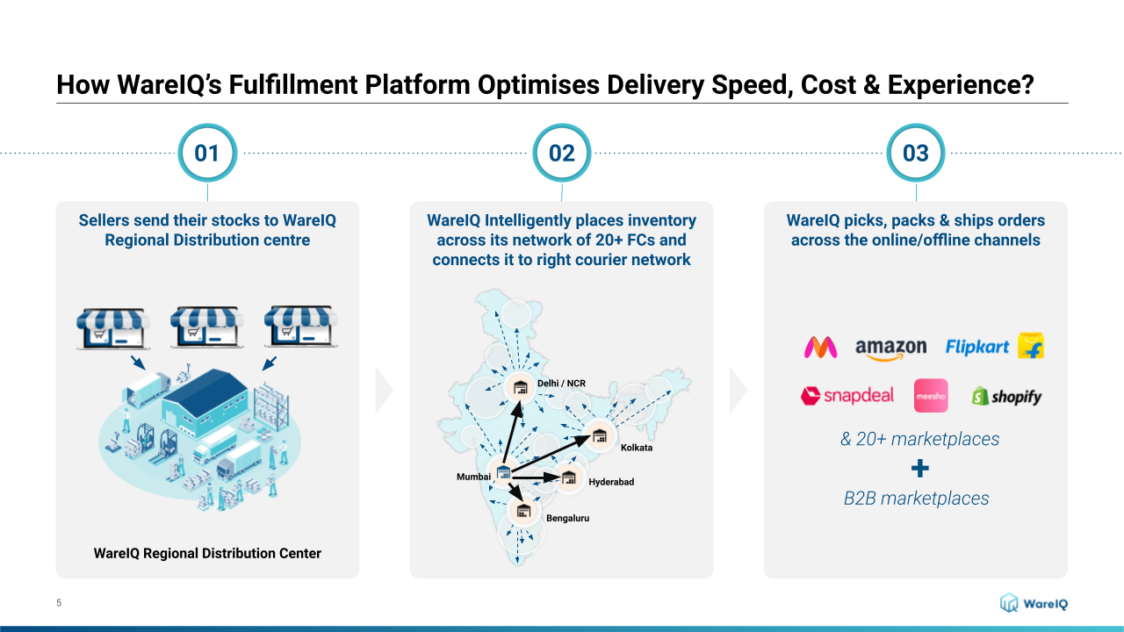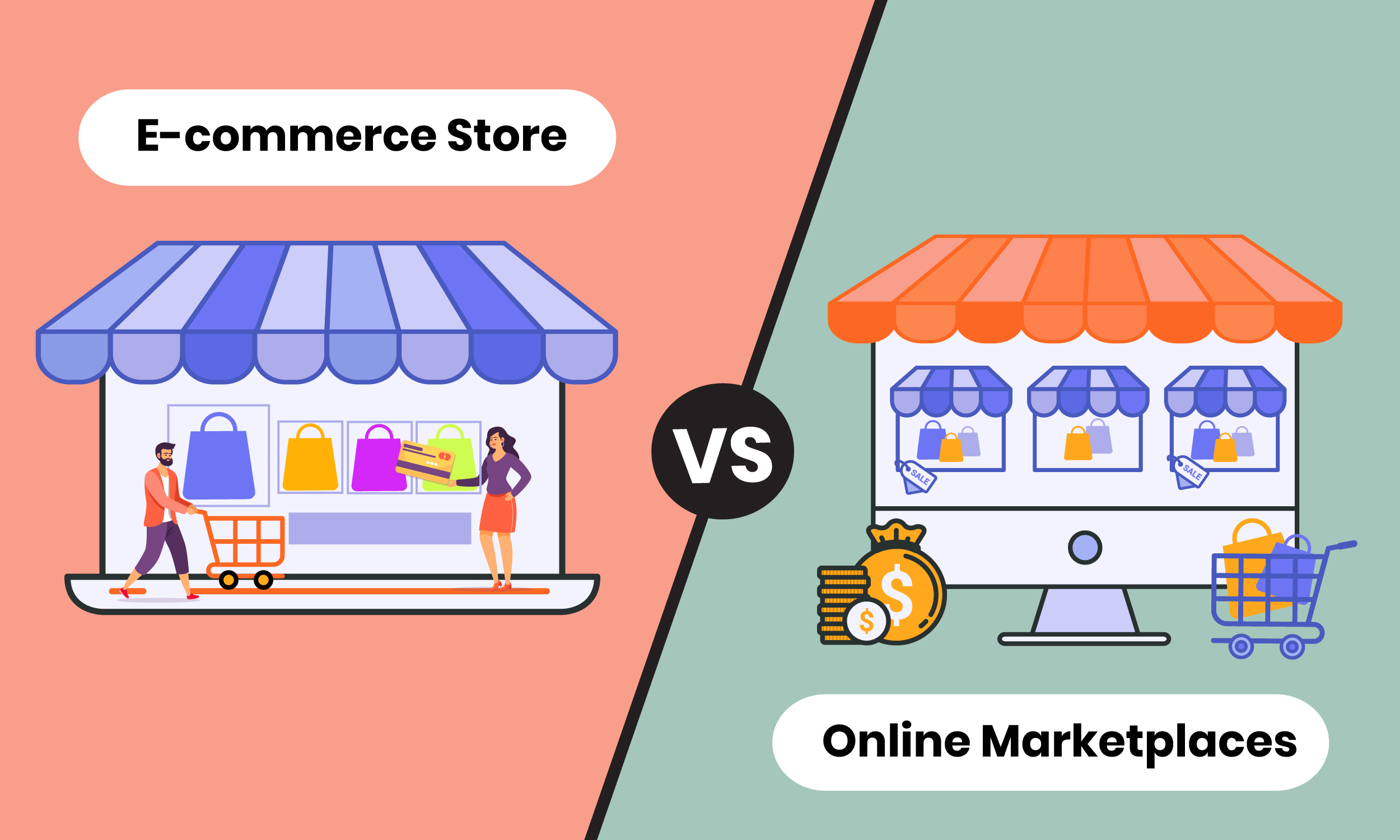Online Store Vs Marketplace: Key Differences to Find Out Which is the Best Option in 2025

A marketplace is a business with a collection of people such as local stores, small enterprises and product owners. Conversely, an online store is the eCommerce website or product listing of a single seller. Selling online, regardless of whether you do it on an online shop vs marketplace, has a lot of advantages. Millions more people can be reached than in a typical store. However, choosing the best platform for your business can be difficult because there seem to be countless possibilities.
Which would you prefer – a website-based online store vs marketplace with an online selling platform? Like you, many people question which platform is best because both can be used by any eCommerce seller. In this blog, we will learn more about the key differences between an online store vs marketplace.
What is an Online Store?
A platform or website where clients can place orders is known as an online store. Additionally, purchases can be made through a product listing, the website of the retailer or any other online platform they sell their goods on. The entity can therefore target any audience, whether it is B2C, B2B or D2C. Depending on the type of eCommerce operations an eCommerce company runs, its website is a location where customers can make direct product purchases. Additionally, eCommerce platforms like Shopify, Magento, WooCommerce, and BigCommerce are used to create most of these websites.
Related Article: How to Start an Online Store?
WareIQ, an eCommerce fulfillment company, empowers online brands with a superior-tech platform to compete with Amazon like service levels by bringing their average delivery timelines from 5-10 days to 1-2 days.
What is a Marketplace?
Any physical or digital space that enables the exchange of goods between buyers and sellers is referred to as a marketplace. Because transactions take place in both directions rather than just one, a marketplace’s business model is different from that of a retail establishment. Almost everything is possible to buy at a market, including party goods, toys for kids, sports equipment and car parts.
Since it is now more affordable than ever to launch an eCommerce business, online marketplaces are growing in popularity. Several of the top online marketplaces for retailers include eCommerce websites such as Amazon, Etsy, Walmart and eBay. Some marketplaces establish restrictions on sellers to guarantee that only products of a certain calibre can be sold. If a market does implement this kind of restriction, it is typically only applicable to certain categories of goods or businesses.
Online Store Vs Marketplace: Key Differences
Both an online shop vs marketplace aims to offer goods to clients. Knowing the advantages and disadvantages of an online store vs marketplace will help you choose which is best for your company. They are listed below:
| Differences | Online store | Marketplace |
|---|---|---|
| Investment | An online store vs marketplace requires very little investment, especially compared to a physical store. Aspects such as website creation and maintenance, marketing and storage are the primary areas of investment. | Compared to an online store, marketplaces require investment in different areas. Due to the fact that you have a variety of vendors and items, you can ask them to manage their own stock and product listings, which will save you money and effort. |
| Finance | With an online store, there is a dilemma that requires you to get rid of some unsold products and possibly cut their pricing at at some point. | On a marketplace, you can quickly remove a product from the listings if it doesn't sell. There are no charges associated with the products because you haven't purchased them. |
| Money Flow | No matter how much money you have invested in an online store, its resources and profit will take time to separate. | Since each transaction contributes to the margin earned, marketplaces always make more money. In order to increase growth, the profit is typically put back into product development. |
| Options | When you visit a conventional online store, you don't have many selections because they only carry a limited number of brands or items. | A marketplace provides several possibilities for selecting products. There will be many different retailers that sell the same and different products at various prices. |
| Amount Spent on Development | Due to the fact that you only need to invest once, an online store is a one-time investment. Additionally, creating a website for an internet store is inexpensive and simple. | A marketplace requires more investment because it is more complicated than an internet store. Additionally, a custom solution and numerous iterations are needed, which can be expensive and difficult without expert assistance. |
| Technology | Platforms like WooCommerce, Shopify, Opencart, and Magento make it simpler to establish an online store, so you don't need any new technology or tools to do it. You only need to be knowledgeable and skilled in coding. | You need assistance while shopping because online marketplaces are built from the ground up using backend and frontend frameworks. You should be aware of the various connectors available, including buyer-seller, split payment, and custom search. All of this needs really competent programming abilities. |
Online Shop Vs Marketplace: Pros & Cons
Pros
- Gives you authority over your platform
- Offers personalization, both in terms of website design and the type of shopping experience you offer the user
- Improves the visual image of your company
- Enables the application of upselling and cross-selling tactics
- Provides control over sales and discount policies
- Offers personalized and direct customer service
- Maintains your customer database and access to personal information for marketing purposes
- Offers behaviour evaluation (visits, clicks, shopping cart abandonment, etc.)
- Helps gain devoted customers
Cons
- Has a greater time and resource commitment
- Has higher costs for security certificates and software
- Requires staff with experience in launching, maintaining and integrating with eCommerce platforms
- Requires control and coordination of shipments, distribution network and stock
- Needs effort to increase the volume of website visitors
Marketplace
Pros
- Is simple to set up
- Is a platform that consumers trust more
- Enables the possibility of distinguishing yourself in categories from your immediate rivals
- Increases inbound traffic
- Saves on administrative procedures (the marketplace receives income for you)
- Has multiple delivery options (the marketplace can manage stock, shipping and returns on your behalf)
Cons
- Increases rivalry (including with the market’s own goods, which will always take precedence)
- Has less personalization
- Has higher fees for transactions (varies per listing, product category and sale, depending on the marketplace)
- Has specific time limits defined by the marketplace
- Has a limited number of promotions for each seller.
- Reduces prices to compete with other sellers
- Market forces determine customer service
- No control over recommendations for upsells and cross-sells
Marketplace Vs Your Own eCommerce Website: Which Option is Best for You in 2025?
Because it is tough to pick a winner in the online store vs marketplace battle, there may not be a clear victor. That’s because both of them provide businesses with perks that are rather alluring. You will have to choose the best ascribes.
An online store is the best option for individuals looking to sell their inventory but only have access to cash because there are additional fees associated with keeping and shipping the product whereas a marketplace is best for retailers that want all the benefits and exposure that come with selling on a marketplace like Amazon or Flipkart. If you need assistance to fulfill eCommerce orders regardless of whether you sell on an online store vs marketplace, WareIQ can be of assistance. WareIQ is a logistics and fulfillment platform that provides easy integrations with 20+ online marketplaces and D2C websites.

WareIQ is an eCommerce fulfillment company that is based in India. We offer a bunch of eCommerce solutions such as inventory storage in a nationwide network of fulfillment centers, a custom WMS that can integrate with multiple eCommerce marketplaces, an app store that can enhance productivity in different areas, a choice of more than 20 shipping aggregators, ultra-fast same-day and next-day delivery, and much more.








